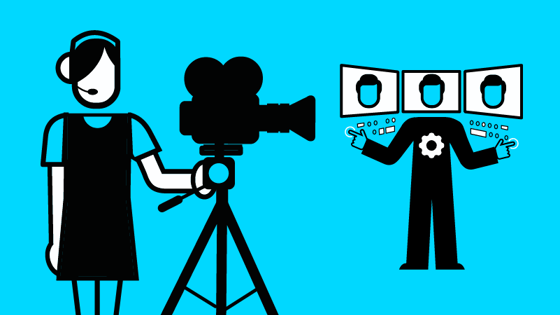Creative industries
Prop maker (creative industries)

Prop makers have skills that are needed in a wide range of creative industries. They are ingenious people who have an eye for visual storytelling, and a deep understanding of material properties, shapes and textures through the use of paint, silicones, foams, plastics and many other materials.
Within screen, prop makers can be found in film and TV drama, unscripted TV and stop-motion animation. They are also needed in community arts and for installations in the museum and heritage sector. There is a place for them commercially too – in shop window dressing and on the sets of advertisements.
The celebrated artist and stage designer Es Devlin began her career preparing props for Le Cirque Invisible. She now uses those skills to make large-scale sculptures for artists in the music industry, like Beyoncé and Adele, as well as for the Royal Opera House. She has also won Emmys for her work on screen.
As the creative industries converge, the skills of prop makers are increasingly needed in the virtual production techniques used in games, film and TV, live music and immersive spaces. This means that where prop makers are able to adapt and learn additional skills, they are very well placed to develop a portfolio career.
Case study – Michael Adefehinti
Michael Adefehinti studied prop making at the Central School of Speech and Drama. During his third year, he also worked in the games industry doing quality assurance. After university, he continued to work in quality assurance, which eventually led him to a media server company, working alongside some of the most prominent creative technologists in the industry.
Michael has now created a niche for himself combining the physicality of prop making with digital lighting, immersive technologies and digital backdrops in virtual production. He has built a career that spans live music, corporate, immersive spaces and film and TV.
“There is quite a lot of demand where these skills overlap,” he says. “So it actually gives me a lot of freedom, both financial and freedom of choice, of which projects I want to be involved in.”
Additional skills
Michael began his career with the core skills of a prop maker – breaking down a script, understanding texture and materials, being able to make 3D objects, knowing the production process within theatre and so on. In order to work within virtual production, Michael has had to learn additional skills. These are:
- Confidence in curiosity – be able to ask “why are we doing this? What’s going on here?” in areas of work that aren’t traditionally a prop maker’s domain
- Lighting sets – understand how to position lights for virtual production and decide how the light will communicate with the desk (DMX, ArtNet, sACN, etc)
- Real-time rendering – understand the pipeline through which modern graphics are created
- Programming languages – learn how to ‘think’ in code, specifically around object-orientated programming, source control and problem solving to create new tools and functionalities
- Video signals engineering – design, draw and route the video signals between the computers and the audio-visual equipment on the virtual production set.
"What I find really cool about this space is that you work with industry veterans who are almost on the same playing field, trying to figure things out at the same time as you."
Tips for developing a portfolio career based on prop making
- Take responsibility for your learning – use free resources like YouTube and Stack Overflow
- Be prepared to experiment and dedicate many evenings to your own development
- Learn from your colleagues. Absorb all you can from the industry professionals around you and integrate their disciplines into your practice
- Don’t be afraid of imposter syndrome. It just means you are in the right place with a bit more to learn
- Learn how to communicate your work in a way that people who don’t come from the same background as you can understand.
"I really enjoy seeing how different creatives approach the same problem. Someone from a computer science background is going to be prone to creating scripts and automating, whereas people that come from more of a creative background tend to create more tools."






